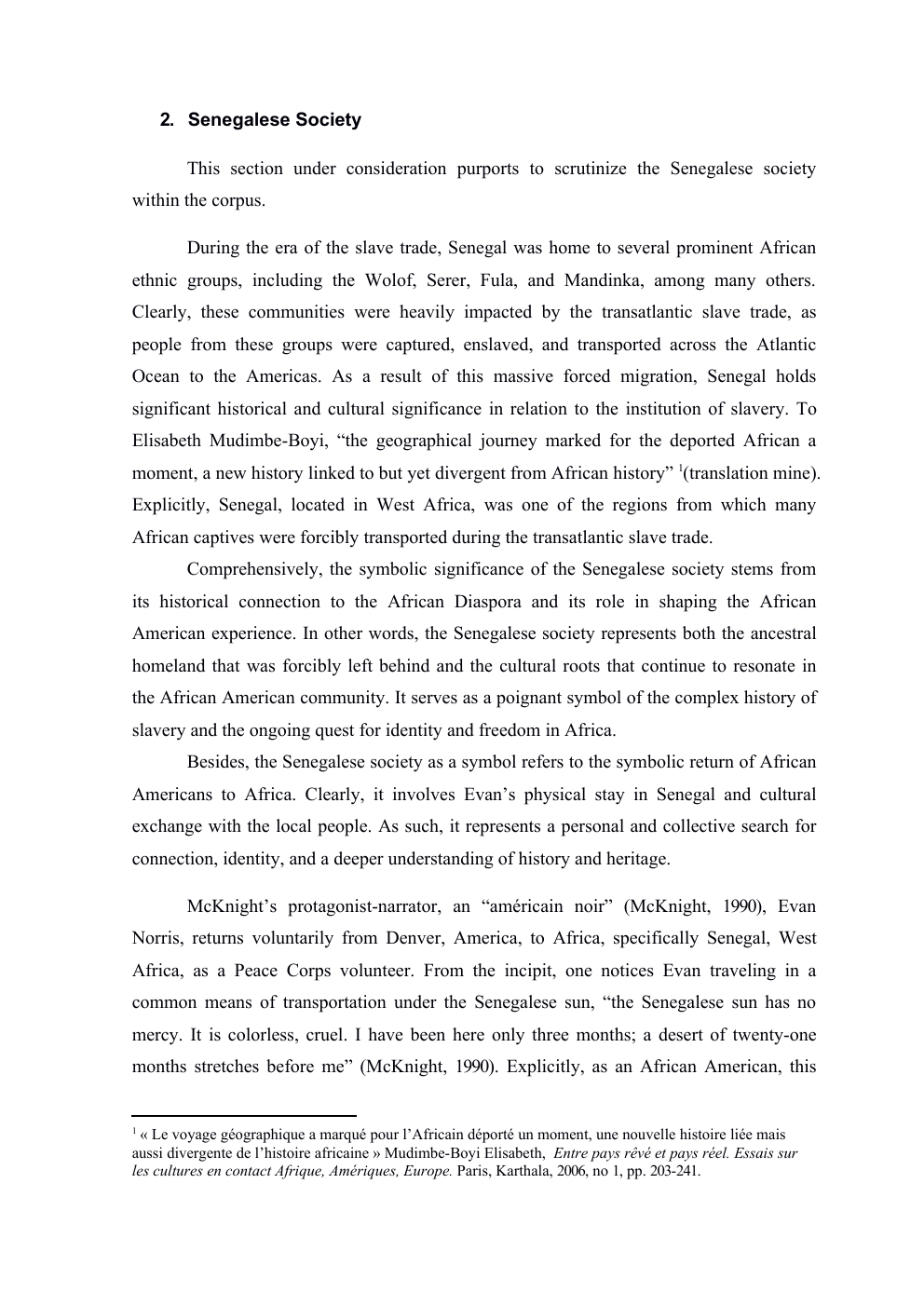Senegalese society
Publié le 15/10/2023
Extrait du document
«
2.
Senegalese Society
This section under consideration purports to scrutinize the Senegalese society
within the corpus.
During the era of the slave trade, Senegal was home to several prominent African
ethnic groups, including the Wolof, Serer, Fula, and Mandinka, among many others.
Clearly, these communities were heavily impacted by the transatlantic slave trade, as
people from these groups were captured, enslaved, and transported across the Atlantic
Ocean to the Americas.
As a result of this massive forced migration, Senegal holds
significant historical and cultural significance in relation to the institution of slavery.
To
Elisabeth Mudimbe-Boyi, “the geographical journey marked for the deported African a
moment, a new history linked to but yet divergent from African history” 1(translation mine).
Explicitly, Senegal, located in West Africa, was one of the regions from which many
African captives were forcibly transported during the transatlantic slave trade.
Comprehensively, the symbolic significance of the Senegalese society stems from
its historical connection to the African Diaspora and its role in shaping the African
American experience.
In other words, the Senegalese society represents both the ancestral
homeland that was forcibly left behind and the cultural roots that continue to resonate in
the African American community.
It serves as a poignant symbol of the complex history of
slavery and the ongoing quest for identity and freedom in Africa.
Besides, the Senegalese society as a symbol refers to the symbolic return of African
Americans to Africa.
Clearly, it involves Evan’s physical stay in Senegal and cultural
exchange with the local people.
As such, it represents a personal and collective search for
connection, identity, and a deeper understanding of history and heritage.
McKnight’s protagonist-narrator, an “américain noir” (McKnight, 1990), Evan
Norris, returns voluntarily from Denver, America, to Africa, specifically Senegal, West
Africa, as a Peace Corps volunteer.
From the incipit, one notices Evan traveling in a
common means of transportation under the Senegalese sun, “the Senegalese sun has no
mercy.
It is colorless, cruel.
I have been here only three months; a desert of twenty-one
months stretches before me” (McKnight, 1990).
Explicitly, as an African American, this
1
« Le voyage géographique a marqué pour l’Africain déporté un moment, une nouvelle histoire liée mais
aussi divergente de l’histoire africaine » Mudimbe-Boyi Elisabeth, Entre pays rêvé et pays réel.
Essais sur
les cultures en contact Afrique, Amériques, Europe.
Paris, Karthala, 2006, no 1, pp.
203-241.
return to his homeland is indeed symbolic.
In fact, Evan’s symbolic return from America to
Africa, specifically Senegal, signifies a connection to the African continent, to the land
from which his ancestors were forcibly taken during the transatlantic slave trade.
At first glance, American society symbolizes cultural heritage for African
Americans.
In fact, Senegal, with its rich cultural heritage, serves as a source of inspiration
and connection for African Americans seeking to explore and reclaim their African roots.
In fact, Evan Norris represents this search for cultural heritage that has been relegated by
the ancestors, the forefathers.
Through Evan’s conversation with Calvin Whitaker, a
director of an English school, one notices this search for cultural heritage in the Senegalese
soil:
“Those space cadets who come out here [Africa] (…) they’re gonna get reunited
with their long-lost kin [Ancestors] (…).
Got a lot of that type [African Descents] coming
out here (Africa) after Roots came out; they try to come out here and become (…) African,
(McKnight, 1990).
Clearly, Calvin Whitaker means that these African Americans are not only
returning to Africa to reconnect with their ancestors and roots, but also to search for their
true cultural identity.
It is noteworthy that the cultural heritage of African Americans was deliberately
stripped away during slavery and subsequent periods of discrimination, leaving them
disconnected from their ancestral homeland and traditions.
Thus, by returning to Africa,
African Americans regain a sense of identity and pride.
In her autobiography, I Know Why
the Caged Bird Sings, Maya Angelou highlights Africa as a point of reference by
suggesting that her understanding of herself and her place in the world is shaped by the
cultural and historical legacy of Africa.
Similarly, Senegalese society symbolizes African American cultural identity.
Explicitly, Evan’s choice to travel by bus in Senegal symbolizes his desire to immerse
himself in the local culture and connect with his African roots.
Indeed, by using this
common mode of transportation in Senegal, he engages with the everyday realities of the
people and seeks a true understanding of his ancestral heritage.
To Elisabeth Mudimbe-Boyi, “the symbolic journey, (…) functions as a metaphor
for an identity quest, an itinerary and an exploration by the novelistic characters of their
own memory; in [African descents] quest for contact with a different society and culture,
they transform the spaces they visit in places of self-knowledge and self-realization”
4
(translation mine).
Simply put, the traditions, customs, music, art, and spirituality of
Senegal become significant touch points for African Americans seeking to reconnect with
their ancestral heritage.
In short, by reclaiming their African heritage and identity, they
regain a sense of....
»
↓↓↓ APERÇU DU DOCUMENT ↓↓↓


